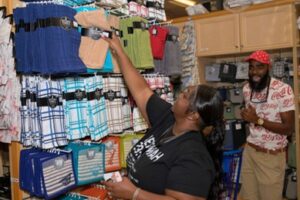NASSAU, Bahamas — Caribbean Bottling Company (CBC), local producers and distributors of Coca-Cola and Dasani products concluded their 10 weeklong Twist To Win campaign with four $5,000 Mall at Marathon shopping sprees.
The campaign which was available throughout the entire Bahamas allowed consumers to enter by purchasing a 20oz bottle with a yellow cap from the following brands: Coca-Cola, Coca-Cola No Sugar, Sprite, Fanta Orange, or Fanta Grape. Each yellow-cap had a unique alpha numeric code underneath which they submitted to the Twist To Win WhatsApp number.
from the following brands: Coca-Cola, Coca-Cola No Sugar, Sprite, Fanta Orange, or Fanta Grape. Each yellow-cap had a unique alpha numeric code underneath which they submitted to the Twist To Win WhatsApp number.
With each qualifying purchase, participants residing in The Bahamas were entered to win instant prizes and into a grand prize draw to win one of four $5,000 shopping sprees at the Mall at Marathon.
Participants also enjoyed exciting instant prizes such as: Airpods, JBL Speakers, premium Coca-Cola merchandise, $500 Visa gift cards and Amazon, Spotify and Apple Music digital gift cards.
Out of 76,000 plus submissions, Brian Bethel, Ashia Demeritte, Merlin Adams, and Taraceta Neely won the coveted Mall at Marathon shopping sprees at the following select stores, Kelly’s House & Home, The Sports Center, John Bull, Brass & Leather, and BTC.
Leading up to the grand finale shopping spree, Coca-Cola hosted a Trivia Showdown with the eight finalists to determine the four winners. Finalists were tested on their knowledge of World History, Pop Culture, Caribbean Bottling Company and Coca-Cola Facts!
After a few rousing rounds of trivia, the four winners were declared after each winning their spot in the shopping spree by answering their questions correctly and choosing the “Grand Prize” Coca-Cola labeled bottles at random.
The morning of the shopping spree Coca-Cola gave the winners exclusive access to the Mall at Marathon and its participating stores before their usual operating hours. Grand prize winners were greeted with wide smiles from Coca-Cola brand representatives and morning bites before the big event.
their usual operating hours. Grand prize winners were greeted with wide smiles from Coca-Cola brand representatives and morning bites before the big event.
At the start of the thirty-minute clock the grand prize winners along with each of their Coca-Cola shopping assistants ran to the various stores collecting items in their arms and carts.
Merlin Adams, a husband and father of four was proud to have executed his game-plan at the end of the shopping spree. With toys, a new phone and materials for his home from Kelly’s, Adams felt accomplished in what he gathered.
Taraceta Neely, a winner from Eleuthera collected beautiful bags for herself and relatives from Brass and Leather and Brian Bethel bought matching athletic and outdoor wear from The Sports Center for his family.
The final winner Ashia Demeritte bought linens and household items in addition to a new phone from BTC right in time for Christmas.
Caribbean Bottling Company is proud to share the real magic of Coca-Cola with the grand prize winners and the may instant prize winners across the Twist To Win campaign. For more updates on new products, promotions, and events follow www.cbcbahamas.com.





























